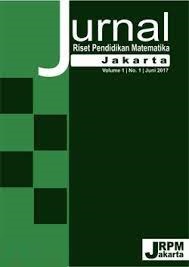Development of E-learning to Improve Mathematical Problem Solving
DOI:
https://doi.org/10.21009/jrpmj.v6i1.29026Keywords:
E-Learning, Problem Solving, mathematicsAbstract
This literature discusses the development of customized E-learning for mathematics education, with a specific focus on enhancing problem-solving skills. The study examines various types of E-learning tools, including websites, e-modules, and Android applications. By integrating innovative technology into mathematics education, this review emphasizes the crucial role of E-learning in facilitating interactive learning experiences and improving students' problem-solving abilities. The expected outcomes of this research include the creation of effective and engaging E-learning modules, improvement of students' mathematical abilities, and the development of a deep understanding of problem-solving strategies. Through a comprehensive analysis of various E-learning approaches, this literature review aims to provide valuable insights into the advanced education world, creating a more empowering learning environment for mathematics students.
References
Aulia, E. T., & Prahmana, R. C. I. (2022). Developing interactive e-module based on realistic mathematics education approach and mathematical literacy ability. Jurnal Elemen, 8(1), 231–249. https://doi.org/10.29408/jel.v8i1.4569
Ayu, D., & Favorina, F. (2020). Analisis Kemampuan Pemecahan Masalah Dengan Menggunakan Model Pbl Berbasis E-Learning Ditinjau Dari Self Confidence.
Basar, Z. M., Mansor, A. N., Jamaludin, K. A., & Alias, B. S. (2021). The Effectiveness and Challenges of Online Learning for Secondary School Students - A Case Study. Asian Journal of University Education, 17(3), 119–129. https://doi.org/10.24191/ajue.v17i3.14514
Calder, N., Jafri, M., & Guo, L. (2021). Mathematics education students’ experiences during lockdown: Managing collaboration in elearning. Education Sciences, 11(4). https://doi.org/10.3390/educsci11040191
Dyah, T., Pramaeda, O., & Ningsih, S. C. (2020). Efektivitas Model Pembelajaran Discovery Learning Berbantuan E-Learning ditinjau dari Kemampuan Pemecahan Masalah. AKSIOMA:Jurnal Matematika Dan Pendidikan Matematika, 11(1).
Gera, I. G. (2020). Analisis Pembelajaran E-Learning dalam Perspektif Aliran Filsafat Pendidikan Progresivisme Irega Gelly Gera. Lisyabab Jurnal Studi Islam Dan Sosial, 1(2), 2722–8096. https://lisyabab-staimas.e-journal.id/lisyabab
Gherheș, V., Stoian, C. E., Fărcașiu, M. A., & Stanici, M. (2021). E-learning vs. Face-to-face learning: Analyzing students’ preferences and behaviors. Sustainability (Switzerland), 13(8). https://doi.org/10.3390/su13084381
Haiprilisya, N., & Cahyono, N. A. (2020). Kemampuan Pemecahan Masalah Matematis Siswa Berbantuan Pertanyaan Metakognitif Berbasis Math Learning. Prosiding Seminar Nasional Pascasarjana UNNES.
Hignasari, L. V., & Supriadi, M. (2020). Pengembangan E-Learning dengan Metode Self Assessment Untuk Meningkatkan Hasil Belajar Matematika Mahasiswa Universitas Mahendradatta. Jurnal Kependidikan: Jurnal Hasil Penelitian Dan Kajian Kepustakaan Di Bidang Pendidikan, Pengajaran Dan Pembelajaran, 6(2), 206. https://doi.org/10.33394/jk.v6i2.2476
Indira, G., & Purba, D. (2021). Universitas Negeri Medan PENERAPAN E-LEARNING MELALUI PEMBELAJARAN BERBASIS MASALAH UNTUK MENINGKATKAN KEMAMPUAN PEMECAHAN MASALAH MATEMATIS MAHASISWA. SEJ (School Education Journal, 11(2).
Kusuma, R., Hidayanto, E., & Chandra, T. (2022). Proses Pemecahan Masalah Trigonometri Berdasarkan Teori John Dewey. Jurnal Cendikia: Jurnal Pendidikan Matematika, 6(2), 1830–1845.
Mailizar, M., Almanthari, A., Maulina, S., & Bruce, S. (2020). Secondary School Mathematics Teachers’ Views on E-learning Implementation Barriers during the COVID-19 Pandemic: The Case of Indonesia. Eurasia Journal of Mathematics, Science and Technology Education, 16, em1860.
https://doi.org/10.29333/ejmste/8240
Nurochmah, Y., & Kharisudin, I. (2023a). Mathematical Modeling Problem Solving Viewed from Students’ Mathematical Self-Concept on Means-Ends Analysis Based on Blended Learning. Unnes Journal of Mathematics Education, 12(2), 167–176. https://doi.org/10.15294/ujme.v12i2.74003
Nurochmah, Y., & Kharisudin, I. (2023b). Mathematical Modeling Problem Solving Viewed from Students’ Mathematical Self-Concept on Means-Ends Analysis Based on Blended Learning. Unnes Journal of Mathematics Education, 12(2), 167–176. https://doi.org/10.15294/ujme.v12i2.74003
Nuryadi. (2019). PENGEMBANGAN MEDIA MATEMATIKA MOBILE LEARNING BERBASIS ANDROID DITINJAU DARI KEMAMPUAN PEMECAHAN MASALAH. Jurnal Pendidikan Surya Edukasi, 5(1), 1–13.
Palera, V., Anriani, N., & Anwar Hadi, C. F. (2019). Bulan Desember Tahun 2019, hal. 103-116 Matematis Siswa. ALGORITMA Journal of Mathematics Education, 1(2), 103–116. https://doi.org/10.15408/ajme.v1i1
Pradiatiningtyas, D. (2017). E-Learning Sebagai Media Pembelajaran Berbasis Web Pada Smk N 4 Purworejo. Ijns.Org Indonesian Journal on Networking and Security, 7(2), 2302–5700.
Shchedrina, E., Galkina, E., Petunina, I., & Lushkov, R. (2020). Integration of Mobile Learning into Complex Problem-Solving Processes During STEM Education. International Journal of Interactive Mobile Technologies, 14(21), 19–37. https://doi.org/10.3991/ijim.v14i21.18463




